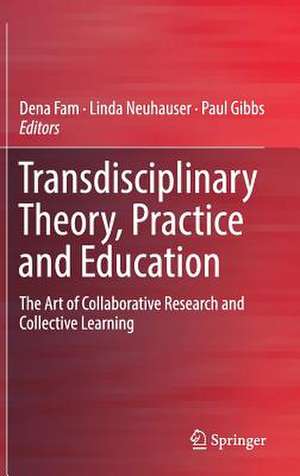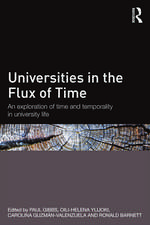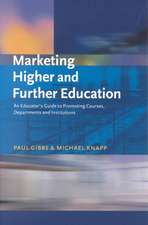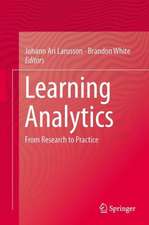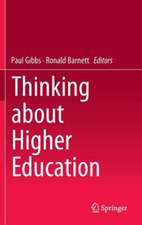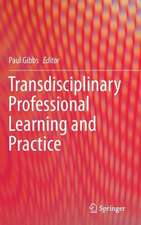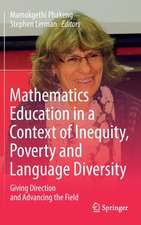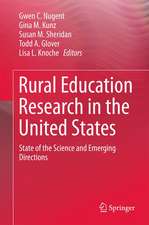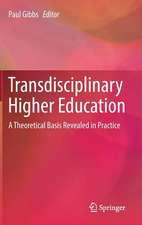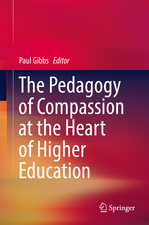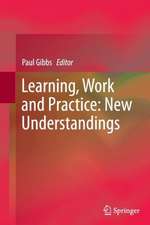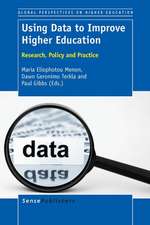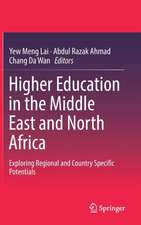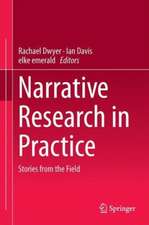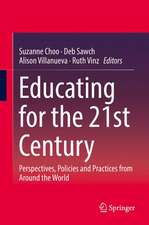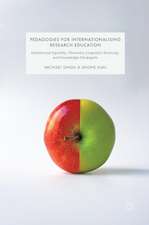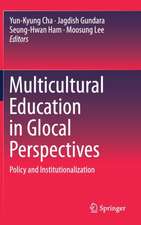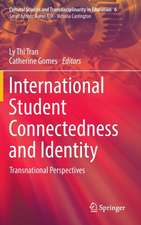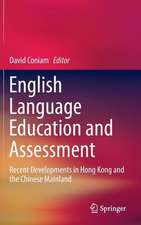Transdisciplinary Theory, Practice and Education: The Art of Collaborative Research and Collective Learning
Editat de Dena Fam, Linda Neuhauser, Paul Gibbsen Limba Engleză Hardback – 11 sep 2018
| Toate formatele și edițiile | Preț | Express |
|---|---|---|
| Paperback (1) | 1111.10 lei 6-8 săpt. | |
| Springer International Publishing – 21 dec 2018 | 1111.10 lei 6-8 săpt. | |
| Hardback (1) | 1116.45 lei 6-8 săpt. | |
| Springer International Publishing – 11 sep 2018 | 1116.45 lei 6-8 săpt. |
Preț: 1116.45 lei
Preț vechi: 1361.54 lei
-18% Nou
Puncte Express: 1675
Preț estimativ în valută:
213.66€ • 222.24$ • 176.39£
213.66€ • 222.24$ • 176.39£
Carte tipărită la comandă
Livrare economică 12-26 aprilie
Preluare comenzi: 021 569.72.76
Specificații
ISBN-13: 9783319937427
ISBN-10: 3319937421
Pagini: 331
Ilustrații: XXXI, 299 p. 29 illus.
Dimensiuni: 155 x 235 mm
Greutate: 0.66 kg
Ediția:1st ed. 2018
Editura: Springer International Publishing
Colecția Springer
Locul publicării:Cham, Switzerland
ISBN-10: 3319937421
Pagini: 331
Ilustrații: XXXI, 299 p. 29 illus.
Dimensiuni: 155 x 235 mm
Greutate: 0.66 kg
Ediția:1st ed. 2018
Editura: Springer International Publishing
Colecția Springer
Locul publicării:Cham, Switzerland
Cuprins
PART I THEORISING TRANSDISCIPLINARITY AS A COLLABORATIVE PRACTICE.- Introduction, Paul Gibbs, Linda Neuhauser and Dena Fam.- Learning and transdisciplinary collaboration: A conceptual vocabulary, Julie Thompson Klein.- Practical and scientific foundations of transdisciplinary research and action, Linda Neuhauser.- Transforming Transdisciplinarity: An expansion of strong transdisciplinarity and its centrality in enabling effective collaboration, Katie Ross and Cynthia Mitchell.- The role of pliability and transversality within trans/disciplinarity: Opening university research and learning to planetary health, Jason Prior, Carole Cusack and Anthony Capon.- The transdisciplinary evolution of the university condition for sustainable development, Basarab Nicolescu.- PART II TRANSDISCIPLINARY LEARNING (EDUCATION).- Meta-considerations for planning, introducing and standardising collective learning in higher degree institutions, Dena Fam, Scott Kelly, Tania Leimbach, Lesley Hitchens and Michelle Callen.- Transdisciplinarity: towards an epistemology of what matters, Kate Maguire.- Trandisciplinarity and the ‘Living Lab Model’: Food waste management as a site for collaborative learning, Alexandra Crosby, Dena Fam and Abby Lopes.- Nurturing transdisciplinary graduate learning and skills through a community of practice approach, Chris Riedy, Cynthia Mitchell, Juliet Willetts and Ian Cunningham.- Making collective learning coherent: An adaptive approach to the practice of transdisciplinary pedagogy, Elizabeth Clarke and Craig Ashhurst.- Making the link between transdisciplinary learning and transdisciplinary design principles, BinBin Pearce, Carolina Adler, Lisette Senn, Pius Krütli, Michael Stauffacher and Christian Pohl.- The Connected Studio: Collective learning in an industry-education research test bed, Tanja Golja, Krista Jordan and Shilo McClean.-PART III TRANSDISCIPLINARY CASE STUDIES.- Shielding Indigenous worlds from extraction and the transformative potential of collaborative research, Jason De Santolo (Tribal affiliations: Garrwa and Barunggam).- Collaborative research and action: The Changzhou Worker Wellness Project, Linda Neuhauser, Xiaodong Wang, Hong Yun, Xiaoming Sun, Zhanhong Zong, Xingyu Shu, Jingshu Mao, Eve Wen-Jing Lee, and Sono Aibe.- Creative partnerships and cultural organizations: “Enabling” and “situating” arts–science collaboration and collective learning, Tania Leimbach and Keith Armstrong.- Climate adapted people shelters: A transdisciplinary reimagining of public infrastructure through open, design-led innovation, Brent Jacobs, Jochen Schweitzer, Lee Wallace, Suzanne Dunford and Sarah Barns.- Reflections on collective learning: open and closed, Valerie Brown.- Philosophical reflections: Coda, Paul Gibbs.
Notă biografică
Dr Dena Fam is a system thinker and transdisciplinary collaborator at the Institute for Sustainable Futures at the University of Technology Sydney. Over the last decade Dena has worked with industry, government and community actors to collaboratively manage, design, research and trial alternative water and sanitation systems with the aim of sustainably managing sewage and reducing its environmental impact on the water cycle. Her consulting/research experience over has spanned socio-cultural (learning for sustainability) institutional (policy analysis), technological aspects of environmental management. With experience in transdisciplinary project development, Dena has increasingly been involved in developing processes for teaching and learning in transdisciplinary programs and projects. In particular she has been involved in documenting and synthesizing processes/methods/techniques supporting the development of transdisciplinary educational programs and projects. Dena has led and co-led international transdisciplinary networking events, grants and projects including an Australian-funded teaching and learning grant.
Professor Linda Neuhauser is Clinical Professor of Community Health Sciences at the School of Public Health, University of California, Berkeley (California, USA) and is Visiting Professor at the Department of Social and Populations Sciences at Nanjing You-Dian University (Nanjing, China). She is also Co-Principal Investigator of the Health Research for Action center (HRA) at the UC Berkeley School of Public Health. Her teaching, research and practice is focused on using participatory methods across disciplines and societal sectors to engage diverse groups to identify and solve problems. She and her center colleagues have used participatory and transdisciplinary methods co-create and test many kinds of health and social interventions in many countries worldwide. She has authored over 100 publications about participatory design, transdisciplinary research and action, and health interventions.
Professor Paul Gibbs is Director of Education Research at the University of Middlesex. He is a professor of the University, founder of the Centre for Education Research and Scholarship and an Honorary Research Fellow at the Open University in Hong Kong and the University of Cyprus. He is currently completing three books: Transdisciplinary happiness and contentment and compassion all within the higher education context. He is also Series Editor of SpringerBriefs on Key Thinkers in Education and Debating Higher Education: Philosophical Perspectives for Springer Academic Press. He writes the marketing of higher education.
Textul de pe ultima copertă
This exciting new state-of-the art book reviews, explores and advocates ways in which collaborative research endeavours can, through a transdisciplinary lens, enhance student, academic and social experiences. Drawing from a wide range of knowledges, contexts, geographical locations and internationally renowned expertise, the book provides a unique look into the world of transdisciplinary thinking, collaborative learning and action. In doing so, the book is action orientated, reflective, theoretical and intriguing and provides a place for all of these to meet and mingle in the spirit of curiosity and imagination.
‘Interested in transdisciplinarity? Want to improve your teaching and research? This book is packed with useful lessons. Whether you want a stronger theoretical grounding, insights into how peers approach teaching of transdisciplinarity, or transdisciplinary research case studies, this book offers a range of imaginative approaches. Dena Fam, Linda Neuhauser and Paul Gibbs have done a superb job of pulling together contributions from 46 authors presenting diverse teaching and research examples from around the world. They lift the lid on this important topic—one that will only grow in significance as research and education organizations embrace the challenges of supporting researchers and preparing students to deal with the myriad complex social and environmental problems the world is confronting’ - Gabriele Bammer, Professor of Integration and Implementation Sciences, The Australian National University
‘With their new book, The art of collaborative research and collective learning: transdisciplinary theory, practice and education, Fam, Neuhauser, and Gibbs supply a valuable resource for all those interested in transdisciplinary research. Adopting an international perspective, the editors recognize the importance of thinking about transdisciplinarity broadly. This emphasis on breadth is reflected in the book's helpful structure, which combines the perspectives of theorists, educational experts, and transdisciplinary practitioners from around the world’ - Professor Michael O’Rourke, Department of Philosophy Faculty, Michigan State University
‘The book offers a broad theoretical discussion which brings together diverse discourses that have not always spoken to one another or taken advantage of parallel trains of intellectual development in diverse fields such as collaborative learning, design theory, innovation approaches, and systems theory, to name but a few. Different case studies also include a variety of concrete methods and ways of working together that promote different examples of boundary breaking collaboration, such as communities of practice, design competitions, field trips, and living labs’ - Dr Merritt Polk, School of Global Studies, University of Gothenburg
‘Interested in transdisciplinarity? Want to improve your teaching and research? This book is packed with useful lessons. Whether you want a stronger theoretical grounding, insights into how peers approach teaching of transdisciplinarity, or transdisciplinary research case studies, this book offers a range of imaginative approaches. Dena Fam, Linda Neuhauser and Paul Gibbs have done a superb job of pulling together contributions from 46 authors presenting diverse teaching and research examples from around the world. They lift the lid on this important topic—one that will only grow in significance as research and education organizations embrace the challenges of supporting researchers and preparing students to deal with the myriad complex social and environmental problems the world is confronting’ - Gabriele Bammer, Professor of Integration and Implementation Sciences, The Australian National University
‘With their new book, The art of collaborative research and collective learning: transdisciplinary theory, practice and education, Fam, Neuhauser, and Gibbs supply a valuable resource for all those interested in transdisciplinary research. Adopting an international perspective, the editors recognize the importance of thinking about transdisciplinarity broadly. This emphasis on breadth is reflected in the book's helpful structure, which combines the perspectives of theorists, educational experts, and transdisciplinary practitioners from around the world’ - Professor Michael O’Rourke, Department of Philosophy Faculty, Michigan State University
‘The book offers a broad theoretical discussion which brings together diverse discourses that have not always spoken to one another or taken advantage of parallel trains of intellectual development in diverse fields such as collaborative learning, design theory, innovation approaches, and systems theory, to name but a few. Different case studies also include a variety of concrete methods and ways of working together that promote different examples of boundary breaking collaboration, such as communities of practice, design competitions, field trips, and living labs’ - Dr Merritt Polk, School of Global Studies, University of Gothenburg
Caracteristici
An integrated, state-of-the art book where practice and theory merge in useful ways
Offers insights for practitioners and academics from a range of disciplinary homes and geographical locations
Has some of the world’s best known contributors on transdisciplinarity
Can be used as a comprehensive resource on trandisciplinarity
Offers insights for practitioners and academics from a range of disciplinary homes and geographical locations
Has some of the world’s best known contributors on transdisciplinarity
Can be used as a comprehensive resource on trandisciplinarity
